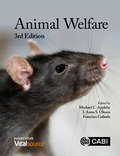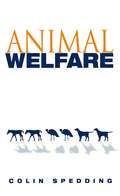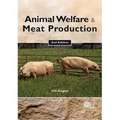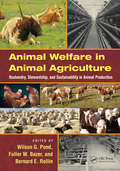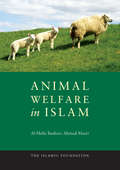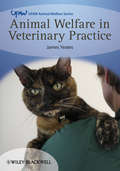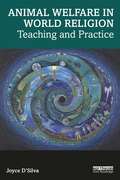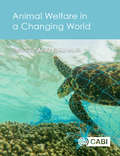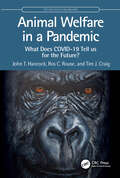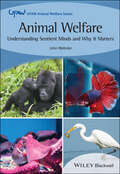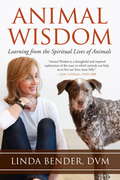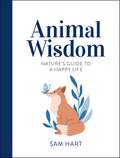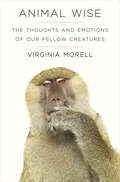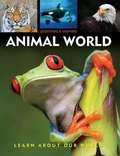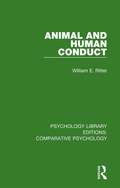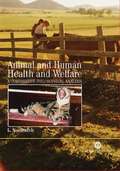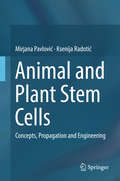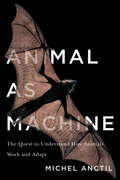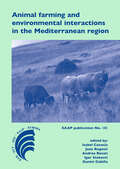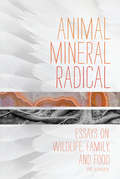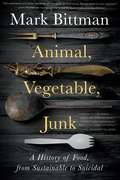- Table View
- List View
Animal Welfare
by Richard Bennett Paul Thompson David Fraser Georgia Mason Clare Palmer Peter Sandøe Christine Nicol Daniel Weary Michael Appleby Anna Olsson Ignacio Viñuela-Fernández Michael Cockram Paul Hemsworth Joy Mench Ilias Kyriazakis Linda Keeling Marek Spinka Birte Nielsen Francisco Galindo Barry Hughes Dominique Blache Alain Boissy Bryan Jones Dr Andrew Butterworth Charlotte C. Burn Grahame J. Coleman Richard B. D’Eath Ian J.H. Duncan Cathy M. Dwyer Paul Flecknell Paul M. Hocking Stella Maris Huertas Joergen B. Kjaer Ute Knierim Shane K. Maloney Professor Michael Mendl Ruth C. Newberry Edmond A. Pajor Jeff Rushen Sally L. Sherwen Claudia Terlouw Bert Tolkamp Natalie K. Waran Francoise Wemelsfelder Nadja Wielebnowski Hanno WürbelUpdated and revised, this bestselling textbook continues to provide a broad introduction to the key topics in the welfare of animals both large and small, farm and companion, wild and zoo. It retains all the popular features of the previous editions with coverage of key issues such as ethics, animal pain and injury, health and disease, social conditions, and welfare dilemmas and problems. Importantly, it also offers practical advice for welfare assessment, with a full section dedicated to the implementation of solutions. The third edition: - Contains many more examples of welfare issues in different countries, particularly the implications for smallholders as well as larger scale agriculture - Covers fish welfare as well as welfare of amphibians, reptiles and invertebrates - Includes concepts of positive emotion and other positive aspects of welfare - Focuses on animal welfare and sustainability - Includes an integrated ebook with additional material and videos With contributions from renowned international experts and a new editorial team, Animal Welfare, 3rd Edition is an essential resource for students and researchers in animal and veterinary sciences and other disciplines considering the science and practice of animal welfare, and for practitioners and decision-makers worldwide.
Animal Welfare
by Sir Colin SpeddingAwareness of the use of animals in human society in fields such as farming, biotechnology and sport is dogged by the lack of a clear and objective exposition of the issues involved and a sense of possible conflict between human and animal welfare. This text addresses these dilemmas - what is the actual scale of the animal welfare problem; where does responsibility begin; what positive steps are actually being taken to alleviate animal suffering; and can a rational and compelling argument be given for the importance of animal welfare. It therefore aims to offer a comprehensive guide to the uninformed as well as those who have knowledge of the issues but lack conviction.
Animal Welfare Challenges in Research and Education on Wildlife, Non-Model Animal Species and Biodiversity: Proceedings Of A Workshop
by Institute for Laboratory Animal Research Division on Earth and Life Studies National Academies of Sciences, Engineering, and MedicineResearch to advance understanding of the ecology and biology of wildlife species is more important than ever as the world confronts issues ranging from biodiversity loss to the emergence of zoonotic diseases. However, the current understanding of animal welfare in research and education has been based on laboratory work with specific domesticated species. Wildlife research represents a starkly different context and with different implications for animal welfare. Wild species that are the subject of research have extremely diverse physiologies and behaviors and live in diverse habitats. This makes it challenging and sometimes impossible for wildlife researchers to follow the recommendations outlined in the Guide for the Care and Use of Laboratory Animals (NRC 2011) and other guidelines developed for a laboratory-based, biomedically focused research context. To explore issues associated with the unique welfare considerations of wildlife research, the National Academies of Sciences, Engineering, and Medicine (under the auspices of the Roundtable on Science and Animal Welfare in Laboratory Animal Use), hosted a workshop titled Discussing and Understanding Animal Welfare Challenges in Research and Education on Wildlife, Non-Model Animal Species, and Biodiversity on February 9-10, 2022. The event, held virtually, included pre-recorded presentations and overarching discussions to explore this topic in breadth and depth. More than 1,800 participants from academia, industry, government, and nonprofit organizations joined the webcast. This proceedings summarizes key topics covered in the workshop presentations and discussions based on transcripts, recordings, and slides from the event.
Animal Welfare and Meat Production
by Temple Grandin Neville GregoryAnimal welfare issues are becoming increasingly prominent in animal production, for both economic and moral reasons. This book presents a clear understanding of the relationship between the welfare of major food animal species and their physiology, and the direct impact this has on meat quality. This new edition focuses on recent research and developments and also looks into welfare in aquaculture.
Animal Welfare in Animal Agriculture: Husbandry, Stewardship, and Sustainability in Animal Production
by Bernard E. Rollin Fuller W. Bazer Wilson G. PondWhat constitutes animal welfare? With animals being used for companionship, service, research, food, fiber, and by-products, animal welfare is a topic of great interest and importance to society. As the world's population continues to increase, a major challenge for society is the maintenance of a strong and viable food system, which is linked to t
Animal Welfare in Islam
by Al-Hafiz Basheer Ahmad MasriThis pioneering modern classic examines the Islamic principles of kindness and compassion toward animals. It compares animal sacrifice as practiced by the world's major religions and highlights the ethical issues that the mass production of meat raises, advocating alternative ways to produce halal meat in an appropriate manner. Basheer Ahmad Masri (1914-1992) was the first Sunni Imam of the oldest purpose-built mosque in Britain, the Shahjahan Mosque in Woking. For six years he served as a joint editor of the monthly Islamic Review. He was fluent in English, classical Arabic, Urdu, Hindustani, Punjabi, and Kiswahili.
Animal Welfare in Veterinary Practice
by James YeatesA practical guide to help veterinarians improve the welfare of their patients in their everyday work. A concise and accessible introduction to welfare that is both interesting and valuable in practice.The book describes ways to evaluate patients, develop in-practice quality of life assessments, resolve difficult clinical dilemmas, and turn good decisions into real welfare outcomes. It reviews available scientific information, legal issues and ethical dilemmas, and relates these to everyday case studies throughout. It provides ways for all veterinary professionals to develop their animal welfare understanding, without assuming prior knowledge, while advancing the wisdom and abilities of experienced practitioners.Key features:Presents practical and realistic methods for working with owners to improve patients' welfare within the constraints of everyday practice.Provides useful advice for work within many legal jurisdictions.Includes summaries of research, vital references, and further reading sources.Key points are recapped at the end of each chapter.Suitable for all those working in the veterinary and related professions, including veterinarians, veterinary nurses, animal welfare scientists, animal behaviourists, paraprofessionals and lay staff.Published as a part of the prestigious Wiley-Blackwell - UFAW Animal Welfare series. UFAW, founded 1926, is an internationally recognised, independent, scientific and educational animal welfare charity. For full details of all titles available in the UFAW series, please visit www.wiley.com/go/ufaw.
Animal Welfare in World Religion: Teaching and Practice
by Joyce D'SilvaThis unique and readable book examines the relationship between religion and animal welfare, taking a detailed dive into the teachings and practices of the major world religions. While there are many books expounding the beliefs of the major religions and many about the rights and welfare of animals, there are few linking the two. With each chapter focusing on one of the five major religions – Judaism, Christianity, Islam, Hinduism and Buddhism – the book explores the beliefs and practices which drive our relationship with and treatment of animals. The book draws on the scriptures of the major faiths and includes the voices of leading historical religious figures and contemporary faith leaders. In doing so, it compares the teachings of old with contemporary practices and showcases the impact of the major religions on both the protection and exploitation of animals, from running animal sanctuaries, to participating in or condoning cruel sports and factory farming. Importantly, the book also includes a chapter looking beyond the major world religions, where it examines a wider range of beliefs and practices, including Indigenous peoples from the USA and Australia, Jainism, Sikhism and Rastafarianism, to provide fascinating insights into another range of beliefs and views on the human-animal relationship. Overall, this book challenges and encourages religious leaders and followers to re-examine their teachings and to prioritise the well-being of animals. This book is essential reading for those interested in the role of religion in animal welfare, human-animal studies, and animal welfare and ethics more broadly.
Animal Welfare in a Changing World
by Temple Grandin David A. Fennell Tomas Norton Paul C. Paquet Elly Hiby Mark Jones Conor Ryan Philip Lymbery Dr Andrew Butterworth Rebecca Aldworth Shelley M. Alexander Regina Asmutis-Silvia Panayiotis Panos Azmanis Prof Daniel Berckmans Lotta Berg Harry Blokhuis Xavier Boivin Dr John Bradshaw Prof. Victoria Braithwaite Stijn Bruers Henry Buller Joyce D’Silva Sarah Dolman Chris Draper Dr Charles Foster Taryn Glass Adam Hart Dr Sophia Hepple Kristof Hermans Dr Miel Hostens Michael J Kuba Miriam Martin Geert Opsomer Maria Panagiotopoulou Mark Simmonds Kalliopi Stara Rigas Tsiakiris Dr Bonny Ranst Paul Whittington Dr James YeatesContemporary and challenging, this thought-provoking book outlines a number of the key dilemmas in animal welfare for today's, and tomorrow's, world. The issues discussed range from the welfare of hunted animals, to debates around intensive farming versus sustainability, and the effects of climate and environmental change. The book explores the effects of fences on wild animals and human impacts on carrion animals; the impacts of tourism on animal welfare; philosophical questions about speciesism; and the quality and quantity of animal lives. The welfare impacts of human-animal interactions are explored, including human impacts on marine mammals, fish, wildlife, and companion and farm animals. Animal Welfare in a Changing World provides: Concise, opinion-based views on important issues in animal welfare by world experts and key opinion leaders. Pieces based on experience, which balance evidence-based approaches and the welfare impacts of direct engagement through training, campaigning and education. A wide-ranging collection of examples and descriptions of animal welfare topics which outline dilemmas in the real world, that are sometimes challenging, and not always comfortable reading. This is a 'must-read' book for animal and veterinary scientists, ethologists, policy and opinion leaders, NGOs, conservation biologists and anyone who feels passionately about the welfare of animals
Animal Welfare in a Changing World
by Temple Grandin David A. Fennell Tomas Norton Paul C. Paquet Andrew Butterworth Elly Hiby Mark Jones Conor Ryan Philip Lymbery Rebecca Aldworth Shelley M. Alexander Regina Asmutis-Silvia Panayiotis Panos Azmanis Prof Daniel Berckmans Lotta Berg Harry Blokhuis Xavier Boivin Dr John Bradshaw Prof. Victoria Braithwaite Stijn Bruers Henry Buller Joyce D’Silva Sarah Dolman Chris Draper Dr Charles Foster Taryn Glass Adam Hart Dr Sophia Hepple Kristof Hermans Dr Miel Hostens Michael J Kuba Miriam Martin Geert Opsomer Maria Panagiotopoulou Mark Simmonds Kalliopi Stara Rigas Tsiakiris Dr Bonny Ranst Paul Whittington Dr James YeatesContemporary and challenging, this thought-provoking book outlines a number of the key dilemmas in animal welfare for today's, and tomorrow's, world. The issues discussed range from the welfare of hunted animals, to debates around intensive farming versus sustainability, and the effects of climate and environmental change. The book explores the effects of fences on wild animals and human impacts on carrion animals; the impacts of tourism on animal welfare; philosophical questions about speciesism; and the quality and quantity of animal lives. The welfare impacts of human-animal interactions are explored, including human impacts on marine mammals, fish, wildlife, and companion and farm animals. Animal Welfare in a Changing World provides: Concise, opinion-based views on important issues in animal welfare by world experts and key opinion leaders. Pieces based on experience, which balance evidence-based approaches and the welfare impacts of direct engagement through training, campaigning and education. A wide-ranging collection of examples and descriptions of animal welfare topics which outline dilemmas in the real world, that are sometimes challenging, and not always comfortable reading. This is a 'must-read' book for animal and veterinary scientists, ethologists, policy and opinion leaders, NGOs, conservation biologists and anyone who feels passionately about the welfare of animals
Animal Welfare in a Pandemic: What Does COVID-19 Tell us for the Future? (CRC One Health One Welfare)
by John T. Hancock Ros C. Rouse Tim J. CraigAnimal Welfare in a Pandemic explores the impact of COVID-19 on a wide array of animals, from those in the wild to companion and captive animals. During the height of the pandemic, a range of animals were infected, and many died, but this was hard to predict, even using up-to-date bioinformatics. Lockdowns around the world had, and continue to have, a major effect on animals’ welfare, influencing pet ownership and care, as well as impacting on the work of conservation institutes due to the lack of visitors and funding and lack of tourist presence in the wild which impacted on anti-poaching efforts. Some of the vast amount of personal protection equipment (PPE) that was distributed was discarded, creating both dangers and occasional opportunities for wild animals. With the rollout of human vaccines, some countries started developing animal vaccines, only some of which were deployed. In summary, the pandemic had a wide-ranging influence on animal welfare around the world. This is reviewed to highlight what can be learned to protect and enhance animal welfare in future epidemics/pandemics, and contribute to a genuinely One Health approach where the health and welfare of both humans and animals are considered holistically.This book is authored by members of the University of the West of England, Bristol, who span a range of expertise in Biological Sciences, Social Sciences, Animal Welfare, and Ethics.
Animal Welfare, 3rd Edition
by Michael C. Appleby I. Anna S. OlssonUpdated and revised, this bestselling textbook continues to provide a broad introduction to the key topics in the welfare of animals both large and small, farm and companion, and wild and zoo. It retains all of the popular features of the previous editions and covers key issues such as ethics, animal pain and injury, health and disease, social conditions, and welfare dilemmas and problems. Importantly, it also offers practical advice for welfare assessment and a full section dedicated to the implementation of solutions. The third edition: - Contains many more examples of welfare issues in different countries, particularly the implications for smallholders as well as larger scale agriculture - Covers fish welfare as well as the welfare of amphibians, reptiles, and invertebrates - Includes concepts of positive emotion and other positive aspects of welfare - Focuses on animal welfare and sustainability - Includes an integrated ebook with additional material and videos With contributions from renowned international experts and a new editorial team, Animal Welfare 3E is an essential resource for students and researchers in animal and veterinary sciences and other disciplines considering the science and practice of animal welfare as well as for practitioners and decision-makers worldwide.
Animal Welfare: Understanding Sentient Minds and Why It Matters (UFAW Animal Welfare #3)
by John WebsterAnimal Welfare An Accessible Overview of the Concept of Sentience Throughout the Animal Kingdom and Why It Matters to Humans Animal Welfare explores the concept of sentience and the development of sentient minds throughout the animal kingdom. The work provides improved definitions and analysis of the ideas of sentience, cognition, and consciousness, along with evidence of advanced mental formulation in birds, fish, and invertebrates. Considerations between humans and animals are also discussed, such as outcome-based ethics in relation to humans’ duties of care and the rights and wrongs of domestication. The work is divided into three parts and covers key topics such as: Specifics of animal sentience, from pain and suffering, to fear and dread, all the way to animals’ social life and the comfort/joy/hope/despair they experience What we know about the sentience of different classes of animals in the waters, air, savannah/plains, and forests Considerations on human interactions based on animal sentience, including death (killing), animal farms, animals in laboratories, wild animals in captivity, and animals in sports and entertainment Analysis on what humans can learn from animals based on what we know about their varying levels of sentience Animal Welfare serves as an invaluable analysis of animal sentience for students, teachers, and professionals directly involved in the study, teaching, and applications of animal behavior, motivation, and welfare. Thanks to the wide-ranging implications of animal sentience, the work will also appeal to everyone with a broader interest in animal behavior and human/animal interactions.
Animal Wisdom
by Andrew Harvey Linda Tucker Linda BenderHow is it that pets are able to travel thousands of miles through unknown territory to reunite with their beloved humans? How can dogs detect cancer with up to a 98 percent accuracy rate, and foresee epileptic or diabetic seizures in their owners? How do animals seem to know an earthquake is coming long before the world's best seismologists? In Animal Wisdom, veterinarian and animal advocate Linda Bender offers a wealth of amazing stories and research-based evidence indicating animals have deeply perceptive--even extrasensory--abilities. She shows us that animals are extremely perceptive, intuitive, and psychic and provides step-by-step practices for honing your natural ability to communicate with them, so that you too can learn to understand their urgent messages about peace, happiness, and the future of the planet. Animal Wisdom is for animal lovers and anyone who seeks a deeper, more spiritual connection to these beautiful creatures.From the table of contents:Foreword by Linda TuckerPART I: The Fabric of CreationChapter 1: The Ecology of ParadiseChapter 2: How Can We Know What Animals Are Thinking and Feeling?PART II: What Animals Want Us to KnowChapter 3: You Are LovedChapter 4: You Are Already Living in ParadiseChapter 5: You Don't Have to Figure Everything OutChapter 6: Dying Isn't BadPART III: The Connection of All CreaturesChapter 7: How to Connect Telepathically with Animals: A Practical GuideChapter 8: The Animals Speak for ThemselvesChapter 9: Heeding the Cries of the Nonhuman WorldAfterword by Andrew HarveyFrom the Trade Paperback edition.
Animal Wisdom: Nature's Guide to a Happy Life
by Sam HartSelf-care gone wild Slow down like a sloth, stretch like a cat, breathe deep like a whale and have the confidence of a lion. When life gets you down, lift your spirits with these tiny tips and helpful hints from our friends in the animal kingdom.
Animal Wise
by Virginia MorellNoted science writer Virginia Morell explores the frontiers of research on animal cognition and emotion, offering a surprising and moving exploration into the hearts and minds of wild and domesticated animals. Did you know that ants teach, earthworms make decisions, rats love to be tickled, and chimps grieve? Did you know that some dogs have thousand-word vocabularies and that birds practice songs in their sleep? That crows improvise tools, blue jays plan ahead, and moths remember living as caterpillars? Animal Wise takes us on a dazzling odyssey into the inner world of animals, from ants to elephants to wolves, and from sharp-shooting archerfish to pods of dolphins that rumble like rival street gangs. With 30 years of experience covering the sciences, Morell uses her formidable gifts as a story-teller to transport us to field sites and laboratories around the world, introducing us to pioneering animal-cognition researchers and their surprisingly intelligent and sensitive subjects. She explores how this rapidly evolving, controversial field has only recently overturned old notions about why animals behave as they do. She probes the moral and ethical dilemmas of recognizing that even "lesser animals" have cognitive abilities such as memory, feelings, personality, and self-awareness--traits that many in the twentieth century felt were unique to human beings. By standing behaviorism on its head, Morell brings the world of nature brilliantly alive in a nuanced, deeply felt appreciation of the human-animal bond, and she shares her admiration for the men and women who have simultaneously chipped away at what we think makes us distinctive while offering a glimpse of where our own abilities come from.
Animal World (Questions and Answers)
by Arcturus PublishingAnimal World is packed full of amazing images and fascinating facts about the magnificent creatures that inhabit the earth. Explore the great diversity of the animal kingdom, from lions to lizards and elephants to eagles - Readers can look forward to learning about them all!
Animal Worlds: African Animals
by Joann Early MackenSimple text introduces animals that live in the African grasslands, such as the zebra, hyena, vulture, leopard, and gnu.
Animal and Human Conduct (Psychology Library Editions: Comparative Psychology)
by William E. RitterOriginally published in 1928, this title looks at the link between animal and human conduct. It had long been recognized on the basis of their activities that many animals possess minds, and that these are similar in a considerable number of respects to human minds. According to the author, this book looks at man’s position within nature from the perspective of a naturalist, rather than a psychologist or philosopher. He has attempted to describe the working of mind and body in human beings and in other living things; to examine critically the mental technique involved in such descriptions; and to reason broadly as to the bearings of the facts and processes on human life. Now it can be read and enjoyed in its historical context.
Animal and Human Health and Welfare
by Lennart NordenfeltScientists within human and animal science have extensively discussed the philosophy of medicine, but never have both sides communicated on their concepts of health, quality of life and welfare, with each other. This book aims to help clarify the difficult but central notions of health and welfare by comparing the human and animal variants of these concepts. Split into three parts this book starts by presenting a background of some of the major theories of human health and welfare, followed by a detailed discussion of theories on animal welfare and health. While the final part of the book tests a comprehensive conceptual framework of a holistic kind, which focuses on the individual's ability to achieve its vital goals.
Animal and Plant Stem Cells: Concepts, Propagation and Engineering
by Mirjana Pavlović Ksenija RadotićThis book provides a multifaceted look into the world of stem cells and explains the similarities and differences between plant and human stem cells. It explores the intersection between animals and plants and explains their cooperative role in bioengineering studies. The book treats both theoretical and practical aspects of stem cell research. It covers the advantages and limitations of many common applications related to stem cells: their sources, categories, engineering of these cells, reprogramming of their functions, and their role as novel cellular therapeutic approach. Written by experts in the field, the book focuses on aspects of stem cells ranging from expansion-propagation to metabolic reprogramming. It introduces the emergence of cancer stem cells and different modalities in targeted cancer stem cell therapies. It is a valuable source of fresh information for academics and researchers, examining molecular mechanisms of animal and plant stem cell regulation and their usage for therapeutic applications. Students at all levels of medical or engineering backgrounds will enjoy the case studies that illustrate and explain mechanisms, interactions, targeted effects, and multimodal therapeutic approaches. Academics, researchers, and professionals who want to expand their knowledge in this field will find this book an exceptional resource.
Animal as Machine: The Quest to Understand How Animals Work and Adapt
by Michel AnctilThrough the ages natural historians have puzzled over how animals work, wavering between a vitalist belief in a soul animating bodily functions and a mechanistic outlook in which animal body parts are seen as pieces of organic machinery.Animal as Machine explores the life, work, and ideas of scientists who, branding themselves as physiologists, subscribed to mechanistic concepts to explain how animals acquire and process food, breathe, circulate their blood, and sense their environment. As medical physiology thrived in the nineteenth century, zoologists struggled to forge their own distinctive physiology predicated on understanding animal functions in a context of environmental adaptation and evolutionary forces. Physiological schools with distinct emphases that shaped their outlook sprang up around the world. Dividing their time between fieldwork in marine stations and laboratory experimentation, animal physiologists stood in awe of the diversity and ingenuity of the functional strategies by which animals survived.Animal as Machine tells a remarkable and insightful story of the larger-than-life personalities and gripping historical episodes that marked the emergence and blossoming of animal physiology.
Animal farming and environmental interactions in the Mediterranean region (European Association for Animal Production #131)
by Dunixi Gabiña Andrea Rosati Igor Stoković Jozo Rogosić Isabel CasasúsLivestock production systems are the result of an interaction between domestic animals and the environment, modulated by man, that dates back to Neolithic times. As a consequence of this interaction among the wide diversity of animal resources, natural habitats and population needs, very different farming systems have developed across the Mediterranean Basin. Understanding the mechanisms and effects of these relationships is key to design the farming systems best adapted to each condition, guaranteeing an adequate balance between target animal production and environmental outcomes provided by these systems. This is indeed a multidimensional topic, influenced by animal genetics, feeding resources, flock management, and economic and social aspects inside and outside the household. Therefore, this book focuses on the basis of the animal-environment interactions and the impact of human activities on the type and magnitude of these interactions. In this context, the issue of sustainability of livestock production is evaluated considering economic, social and environmental aspects. This book contributes to upgrade the state of the art in Mediterranean conditions, providing indicators and procedures of application across a wide range of systems, and hence of interest for researchers, students and professionals concerned with livestock production and the environment.
Animal, Mineral, Radical: Essays on Wildlife, Family, and Food
by Bk Loren"Radical, before it meant a person who advocates strong political reform, meant getting to the root of things, the origin. It comes from the Latin radix, radicis,, meaning radish, a root vegetable."-BK LorenThese meditative essays range in subjects from a transcendental encounter with a pack of coyotes ironically juxtaposed with her neighbor's claim that nature "has gone out of vogue," to Loren's mother's slow yet all-encompassing deterioration from Parkinson's, and the unexpected way the Loma Prieta earthquake eroded her depression by offering the author a sense of her small place in a wild and worthwhile world.Loren has an empathetic and gentle approach to the world. In detailing the intricacies of human relationships and consciousness-fear of death and time, cooperation born of clashing viewpoints, tradition's beauty even when destructive, a love of language, a sense of loss amid the fast-paced materialistic world-she peels back the film of popular thinking in order to expose herself to the secrets so few of us ever see.
Animal, Vegetable, Junk: A History of Food, from Sustainable to Suicidal
by Mark BittmanFrom hunting and gathering to GMOs and ultraprocessed foods, this expansive tour of human history rewrites the story of our species—and points the way to a better future.The history of Homo sapiens is usually told as a story of technology or economics. But there is a more fundamental driver: food. How we hunted and gathered explains our emergence as a new species and our earliest technology; our first food systems, from fire to agriculture, tell where we settled and how civilizations expanded. The quest for food for growing populations drove exploration, colonialism, slavery, even capitalism. A century ago, food was industrialized. Since then, new styles of agriculture and food production have written a new chapter of human history, one that&’s driving both climate change and global health crises. Best-selling food authority Mark Bittman offers a panoramic view of the story and explains how we can rescue ourselves from the modern wrong turn.
